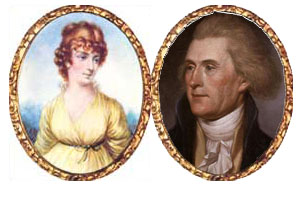Unpacking the Jefferson Legacy: Thomas and Martha

Who were the people behind the public figure of Thomas Jefferson, the author of the Declaration of Independence? This exploration delves into the lives of Thomas and Martha Wayles Skelton Jefferson, revealing the personal dynamics and historical context that shaped their contributions to early American history. We'll examine not just the political achievements of the third President, but also the crucial role Martha played in his life and the challenges they faced together.
Thomas Jefferson, a polymath of the Enlightenment era, made indelible marks on American politics, architecture, and philosophy. Born into the Virginia gentry, he rose to prominence as a lawyer, statesman, and diplomat. His authorship of the Declaration of Independence cemented his place in history, embodying the American ideals of liberty and self-governance. Martha Wayles Skelton, a widow when she married Thomas, brought her own wealth and social standing to the union. She played a significant role in managing their Monticello estate and raising their children, providing a vital domestic foundation for Jefferson's demanding public life.
Understanding the Jeffersons requires an appreciation of their historical context. Eighteenth-century Virginia was a society built on agriculture and enslaved labor, a paradox that deeply influenced Jefferson's life and legacy. While he espoused ideals of liberty and equality, he was also a slave owner, a contradiction that continues to fuel debate and discussion. Martha, too, lived within the constraints of her time, managing a household dependent on enslaved individuals. Exploring their lives offers a glimpse into the complexities of the early American South.
The importance of Thomas Jefferson lies primarily in his contribution to the founding and shaping of the United States. His political philosophy, articulated in the Declaration of Independence, profoundly influenced the course of American history. He championed limited government, individual rights, and agrarian ideals, shaping the nation's identity in its formative years. Martha, while less publicly visible, played a crucial role in supporting her husband's political career and managing their family life, providing stability amidst the turmoil of revolution and nation-building. Their partnership, though cut short by Martha's premature death, represented a vital dynamic in Jefferson's personal and public trajectory.
A central issue surrounding the Jefferson legacy is the question of slavery. While he expressed some anti-slavery sentiments, Jefferson never freed the majority of those enslaved at Monticello. This inherent contradiction between his words and actions continues to be a source of controversy. The relationship between Thomas Jefferson and Sally Hemings, an enslaved woman at Monticello, is another area of significant historical debate. DNA evidence suggests a familial link between Hemings' descendants and Jefferson, adding another layer of complexity to his already complicated legacy.
Understanding the complexities of the Jefferson and Wayles families requires an examination of the social structures of the time. The plantation system, with its reliance on enslaved labor, shaped the lives of both the enslavers and the enslaved. Martha's role as a plantation mistress involved overseeing the domestic affairs of Monticello, including the management of enslaved individuals. This examination offers valuable insights into the dynamics of power, privilege, and oppression that defined this era.
Though no specific action plan is relevant to historical figures, understanding their lives offers valuable lessons. Studying the Jeffersons can inspire critical thinking about the contradictions of the past and the enduring challenges of achieving true equality and justice. Examining their story can promote a more nuanced understanding of American history and the ongoing struggle to live up to the ideals of the nation's founders.
Advantages and Disadvantages of Studying the Jeffersons
| Advantages | Disadvantages |
|---|---|
| Understanding the Founding Fathers' philosophies | Confronting difficult historical truths about slavery |
| Gaining insight into early American history | Potential for biased interpretations of historical events |
Frequently Asked Questions:
1. What was Thomas Jefferson's most significant contribution to American history? Authorship of the Declaration of Independence.
2. What role did Martha Jefferson play in her husband's life? She provided crucial domestic support and managed their estate.
3. What is Monticello? Thomas Jefferson's plantation home in Virginia.
4. What is the controversy surrounding Sally Hemings? The question of her relationship with Thomas Jefferson and their descendants.
5. What were some of Thomas Jefferson's other accomplishments? He served as the third president, founded the University of Virginia, and made significant contributions to architecture.
6. What were some of the challenges faced by Martha Jefferson? Managing a large household, including enslaved individuals, and dealing with frequent illnesses.
7. How did Martha Jefferson’s death affect Thomas Jefferson? He was deeply affected and withdrew from public life for a period of time.
8. What is the significance of studying the Jefferson family? Understanding the complexities of early American history and the legacy of slavery.
In conclusion, the lives of Thomas and Martha Jefferson provide a fascinating window into early American history. While Thomas Jefferson’s contributions to American political thought and the founding of the nation are undeniable, it's equally important to acknowledge the complexities of his legacy, including his ownership of enslaved people. Martha Jefferson’s contributions, though less visible on the public stage, were vital to their family and to Thomas’s ability to pursue his political career. Examining their lives together provides a more complete understanding of this pivotal period in American history, encourages critical thinking about the past, and fosters a more nuanced understanding of the challenges and contradictions that shaped the nation. Learning about the Jeffersons is a valuable endeavor for anyone seeking a deeper appreciation of American history and the ongoing struggle for equality and justice.
Decode your boats dna understanding hull numbers
Halcyon green serene sophistication for your home
Spice up your mornings romantic good morning memes for her













